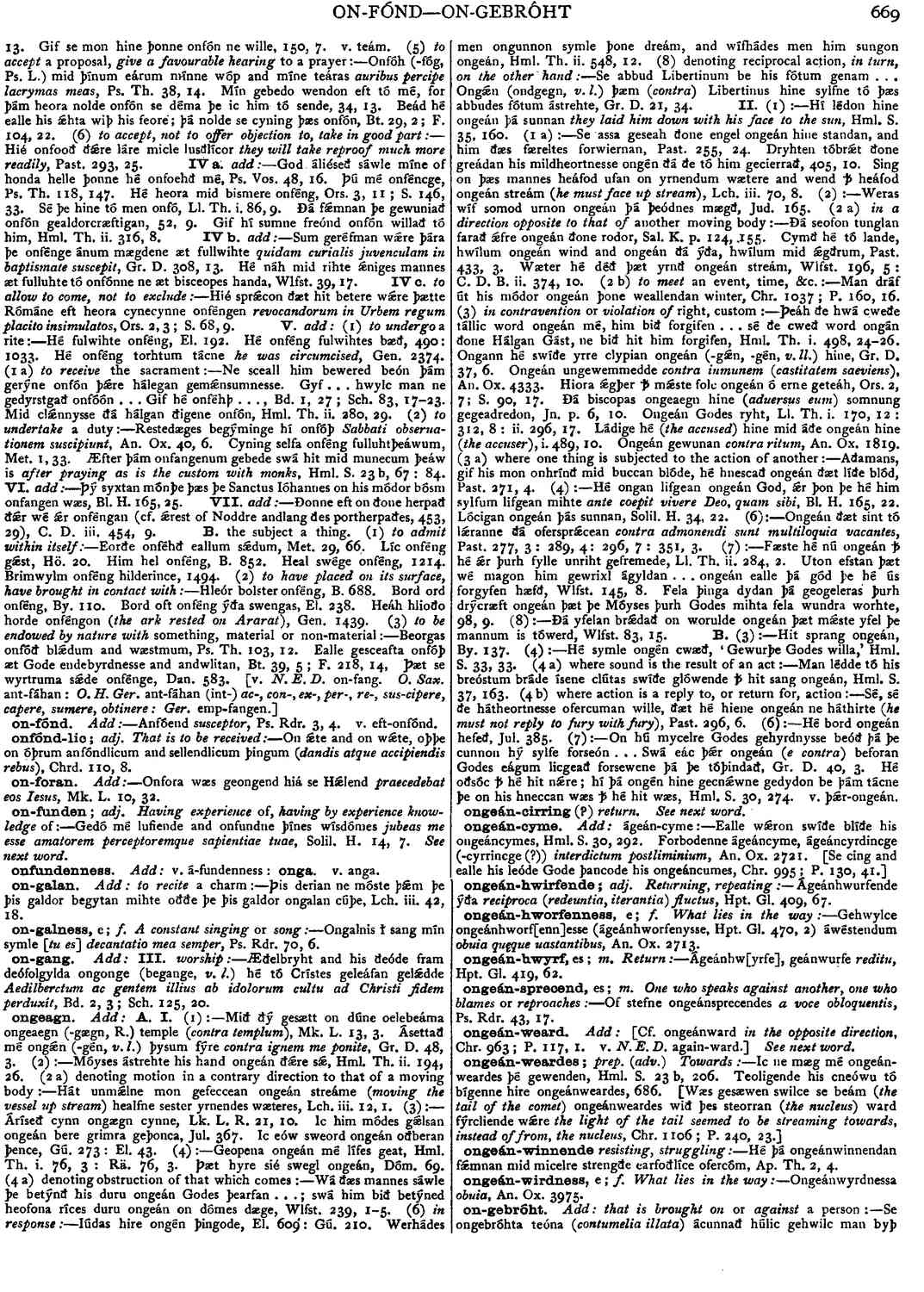ongeagn
-
Mið ðý gesætt on dúne oelebeárna ongeaegn (-gægn, R.) temple
(contra templum),
- Mk. L. 13, 3.
-
Ásettað mé ongǽn (-gén, v. l.) þysum fýre
contra ignem me ponite,
- Gr. D. 48, 3.
-
Móyses ástrehte his hand ongeán ðǽre sǽ, Hml. Th. ii. 194, 26. (2 a) denoting motion in a contrary direction to that of a moving body :-- Hát unmǽlne mon gefeccean ongeán streáme
(moving the vessel up stream)
healfne sester yrnendes wæteres,- Lch. iii. 12, 1.
-
Áríseð cynn ongægn cynne,
- Lk. L. R. 21, 10.
-
Ic him módes gǽlsan ongeán bere grimra geþonca,
- Jul. 367.
-
Ic eów sweord ongeán oðberan þence,
- Gú. 273 : El. 43.
-
Geopena ongeán mé lífes geat,
- Hml. Th. i. 76, 3 : Rä. 76, 3.
-
Þæt hyre sié swegl ongeán,
- Dóm. 69. (4 a)
-
Iúdas hire ongén þingode,
- El. 609: Gú. 210.
-
Werhádes men ongunnon symle þone dreám, and wífhádes men him sungon ongeán,
- Hml. Th. ii. 548, 12.
-
Se abbud Libertinum be his fótum genam . . . Ongǽn (ondgegn, v. l.) þæm
(contra)
Libertinus hine sylfne tó þæs abbudes fótum ástrehte,- Gr. D. 21, 34.
-
Hí lédon hine ongeán þá sunnan
they laid him down with his face to the sun,
- Hml. S. 35, 160. (1 a) :-- Se
-
Dryhten tóbrǽt ðone greádan his mildheortnesse ongén ðá ðe tó him gecierrað,
- 405, 10.
-
Sing on þæs mannes heáfod ufan on yrnendum wætere and wend ꝥ heáfod ongeán streám (
he must face up stream),
- Lch. iii. 70, 8.
-
Weras wíf somod urnon ongeán þá þeódnes mægð, Jud. 165. (2 a)
in a direction opposite to that of
another moving body :-- Ðá seofon tunglan farad ǽfre ongeán ðone rodor,- Sal. K. p. 124, 155.
-
Cymð hé tó lande, hwílum ongeán wind and ongeán ðá ýða, hwílum mid ǽgðrum,
- Past. 433, 3.
-
Wæter hé déð þæt yrnð ongeán streám, Wlfst. 196, 5 : C. D. B. ii. 374, 10. (2 b)
to meet
an event, time, &c. :-- Man dráf út his módor ongeán þone weallendan winter,- Chr. 1037 P. 160, 16.
-
Þeáh ðe hwá cweðe tállic word ongeán mé, him bið forgifen . . . sé ðe cweð word ongán ðone Hálgan Gást, ne bið hit him forgifen,
- Hml. Th. i. 498, 24-26.
-
Ongann hé swíðe yrre clypian ongeán (-gǽn, -gén,
v. ll.)
hine,- Gr. D. 37, 6.
-
Ongeán ungewemmedde
contra inmunem (castitatem saeviens),
- An. Ox. 4333.
-
Hiora ǽgþer ꝥ mǽste folc ongeán ó erne geteáh,
- Ors. 2, 7; S. 90, 17.
-
Ðá biscopas ongeaegn hine
(aduersus eum)
somnung gegeadredon,- Jn. p. 6, 10.
-
Ongeán Godes ryht,
- Ll. Th. i. 170, 12 : 312, 8 : ii. 296, 17.
-
Ládige hé (the accused) hine mid áðe ongeán hine (
the accuser),
i.- 489, 10.
-
Ongeán gewunan
contra ritum,
- An. Ox. 1819. (3 a)
-
Hé ongan lifgean ongeán God, ǽr þon þe hé him sylfum lifgean mihte
ante coepit vivere Deo, quam sibi,
- Bl. H. 165, 22.
-
Lócigan ongeán þás sunnan,
- Solil. H. 34, 22.
-
Ongeán ðæt sint tó lǽranne ðá ofersprǽcean
contra admonendi sunt mulliloquia vacantes,
- Past. 277, 3 : 289, 4: 296, 7 : 351, 3.
-
Fæste hé nú ongeán ꝥ hé ǽr þurh fylle unriht gefremede,
- Ll. Th. ii. 284, 2.
-
Uton efstan þæt wé magon him gewrixl ágyldan . . . ongeán ealle þá gód þe hé ús forgyfen hæfð,
- Wlfst. 145, 8.
-
Fela þinga dydan þá geogeleras þurh drýcræft ongeán þæt þe Móyses þurh Godes mihta fela wundra worhte,
- 98, 9.
-
Ðá yfelan brǽdað on worulde ongeán þæt mǽste yfel þe mannum is tówerd,
- Wlfst. 83, 15. B.
-
Hit sprang ongeán,
- By. 137.
-
Hé symle ongén cwæð, 'Gewurþe Godes willa,' Hml. S. 33, 33. (4 a) where sound is the result of an act :-- Man lédde tó his breóstum bráde ísene clútas swíðe glówende ꝥ hit sang ongeán, Hml. S. 37, 163. (4 b) where action is a reply to, or return for, action :-- Sé, sé ðe hátheortnesse ofercuman wille, ðæt hé hiene ongeán ne háthirte (
he must not reply to fury with fury),
- Past. 296, 6.
-
Hé bord ongeán hefeð,
- Jul. 385.
-
On hú mycelre Godes gehyrdnysse beóð þá þe cunnon hý sylfe forseón . . . Swá eác þǽr ongeán (
e contra)
beforan Godes eágum licgeað forsewene þá þe tóþindað,- Gr. D. 40, 3.
-
Hé oðsóc ꝥ hé hit nǽre; hí þá ongén hine gecnǽwne gedydon be þám tácne þe on his hneccan wæs ꝥ hé hit wæs,
- Hml. S. 30, 274.
Bosworth, Joseph. “ongeagn.” In An Anglo-Saxon Dictionary Online, edited by Thomas Northcote Toller, Christ Sean, and Ondřej Tichy. Prague: Faculty of Arts, Charles University, 2014. https://bosworthtoller.com/56516.
Checked: 0